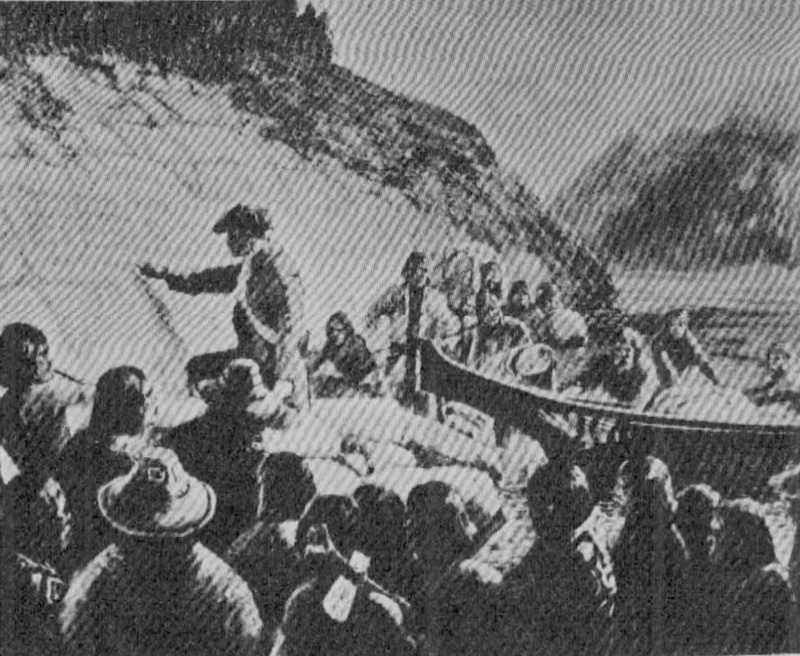
HISTORICAL EVENTS THAT TOOK PLACE ON THIS DAY IN CANADA
22 July

Mackenzie records his achievements, 1793
Mackenzie Ends Trip
On July 22, 1793, Alexander Mackenzie painted a message on a large rock at Bella Coola, British Columbia: "Alexander Mackenzie, from Canada, by land, the twentysecond of July, one thousand, seven hundred and ninety-three." It marked the end of one of the most remarkable journeys in Canadian, or any other, history.
Mackenzie set out in search of the Pacific on May 9, 1793, after special training in navigation and astronomy in England. Mackenzie wrote later that words failed to express the anxiety, suffering, and dangers of the journey across 500 miles of mountains. From the beginning, he and his companions were often fortunate to escape being dashed to pieces in the turbulent waters of the Peace and Fraser rivers.
Mackenzie went down the Fraser as far as Alexandria, but the Indians there told him that he would not be able to continue. So the expedition went back 60 miles until it reached the junction of what is now the Blackwater River. After they had worked their way up the Blackwater for some distance, Mackenzie decided they should try to get to the Pacific on foot. Each man carried a gun and a 90-pound pack. The canoe and the rest of their supplies were hidden.
The expedition walked westward for two weeks. Each night Mackenzie had to sleep next to the Indian guide to prevent him from sneaking away. Finally they came to an Indian camp on the Bella Coola River. Here they traded goods for boats dug out of logs and continued down the river, passing through forests whose trees were bigger than any they had ever seen. By July 20, they found themselves paddling through salt water. Two days later they saw the waters of the Pacific. Mackenzie's quadrant told him that they were at Latitude 500 20' 48" N. He inscribed his famous message on the rock using a paint made from the vermilion he had brought for the Indians.
The small party had not been there long when a party of obviously hostile Indians approached and made signs that they had been fired on by white men. It had probably happened when some of Captain Vancouver's men had explored that part of the coast. Mackenzie and his men retreated quickly, despite their jubilation.
OTHER NOTABLE EVENTS ON THIS DAY IN CANADIAN HISTORY
22 July
-1635 Champlain held a council with the Indians at Quebec. He died late that year.
-1812 General Brock issued a proclamation countering the one issued by General Hull (see July 12).
-1847 The Imperial Act gave Canada control of taxation.
-1884 The boundary of Ontario was defined by the Imperial Privy Council.
-1915 Sir Sandford Fleming, engineer and railway builder, died. He also originated the system of "standard time" (see November 18).
-1944 Royal Canadian Mounted Police patrol boat St. Roch left Halifax for Vancouver by way of the Northwest Passage. The trip was made in 86 days.